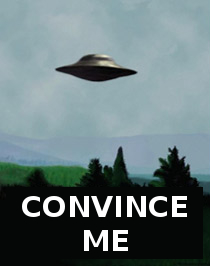WARNING: POTENTIAL SPOILERS RIGHT UP FRONT!
The X Files returned to broadcast following a 14 year hiatus (when a show comes back after this long with the original actors, it’s a hiatus, not a reboot).
It’s certainly a bit edgier than the original run. You kind of have to say that when the second half of the season opener features Fox Mulder on the brink of getting a blow job from the clandestine gay lover of a subject that committed suicide/was murdered in a very unusual and graphic manner.
Maybe it’s having watched Fox Mulder David Duchovony in Californication (recommended), but I half expected him to go for it and obtain some kind of revelation in the process. Followed by knowing and snide commentary from Scully.
But it only turned out to be a bit of humor that advanced the plot. No consummation for slash/fic fans (but boy don’t you think those pencils are scribbling furiously now…)
Critics have complained that the opening episode was less than spectacular; fans have cautioned patience. The critics seem to have forgotten what the fans know well: one of the appeals of X Files past has been that you were always left wondering if you’d gotten the whole story. No matter how conclusive the ending of a case might have seemed, anyone even marginally familiar with the show KNEW that a single episode was only the peeling back of a single layer of the cosmically infinite onion that is the back story of the X Files.
The back story (vaguely – that shadowy quasi-governmental forces are in league with alien invaders who screw with humans for their own largely inscrutable, if not nonsensical, reasons) has been flipped on its head: Roswell was a Soviet invasion plot; science and technologies that didn’t even exist when the show first premiered are now part of the conspiracy. Indeed, every half-baked conspiracy theory that ever appeared beneath a tinfoil hat has been roped in, twisted through 90 degrees and run through a Waring blender while the Cigarette Smoking Man holds down the high speed button.
The production values exceed those of the original show. (Check out the screen captures from the first episode below.) All of the familiar characters are in place, stepping into their roles as if 14 years did not intervene. The dialogue is just as snappy and head-turning as it ever was; the chemistry between Scully and Mulder is stronger and, apparently, more deeply layered than it has ever been.
Scully is in grave danger and Skinner has re-opened the X Files.
No one knows who to trust; no one knows who or what is pulling the strings and that title opening music is just as intriguing and goosebump inspiring as it has ever been.
***
In reading the reviews to gage reaction, I came across one critics’ mention that the X Files was the “longest running sci fi show in television history”.(which may or may not be accurate depending upon a number of factors) but that’s a minor concern. What caught my attention was the categorizing of the show as “sci fi”.
In one respect, yes. If you use the old school understanding of “sci fi” as in (at least in this case) science drek. That applies across the board, from individual episodes to the entire series, because the show is based on conspiracy theory and conspiracy theories are inherently anti-logic. Every popular conspiracy theory asks skeptics to disprove a negative – which simply can’t be done.
But in other respects, the X Files is not science fiction. In fact, the X Files plays firmly on ground that is, and apparently always has been, on the fringes of science fiction.
Way back in the 1940s, Ray Palmer introduced conspiracy theories and fringe science to Amazing Stories. Circulation spiked over 100,000 copies per issue. In addition to the Shaver “mysteries” (alien races live deep within the Earth and try to control humanity), he attempted to draw in the (newly born) UFO crowd (that effort roundly and soundly rejected by the SF community)
During his latter days Campbell increasingly turned his attention to fringe science – ESP, the Dean drive, mental “programming” (Dianetics) and more.
When the big budget SF magazine Omni was launched in the 80s, it contained a center section entirely devoted to UFOs and fringe science, – ghosts, ESP, Big Foot.
When the Sci Fi channel (now SyFy) sought to increase its market share, the very first thing it did was to introduce paranormal-related reality shows.
And of course in the 1990s, the original X Files was far more popular than any straight SF show.
It seems that since the 1940s, the business of science fiction has regularly turned to the pseudo-scientific conspiracy theory to increase its popularity.
Which is a very unsettling idea for anyone who buys into the idea of science fiction as “candy-coated science” designed to popularize science and technology for the masses.
And it most definitely seems to be the combination of the two for the formula to work. Pseudo-scientific concepts still persist in good science fiction (take the telepaths from Babylon 5 as example) (with the caveat that when used, they still have some connection to real science, regardless of how tenuous), but they are not presented as “real”, nor are they accompanied by the implied idea that the individual is somehow endangered by the revelation.
This is definitely a thing. And a puzzling one. Why is an audience that seems to be largely ignorant of real science the go-to market for science fiction when it wants to grow? That would seem to be the very last place one would look for a new audience – people who have forsworn the basic tenets of the scientific method in favor of impossible claptrap and the belief that all of it is somehow designed to keep them from knowing the truth.
Imagination and a willingness to suspend disbelief would seem to be prerequisites for audiences of both science fiction and pseudo-scientific conspiracy theories. That might seem to be the connection, yet when Palmer tried to merge the UFO crowd with the SF crowd, SF was having none of it. (The rejection of “Ufology” within SF circles persists to this day.) LIkewise things like “free energy”, weather control via HARP, chemtrails, most aspects of “cryptozoology”, alien abductions, cattle mutilations and secret worlds inside the Earth accessed through holes at the north or south pole. (Indeed, on the few occasions that I’ve seen vendors at conventions who feature this kind of stuff in their wares, I’ve watched most attendees give that booth a wide berth when walking past, almost as if they were afraid of catching something if they got too close.)
I’d suggest that the seeming shared interests of the two groups causes confusion among marketing types (who often strike me as dyed-in-the-wool conspiracy theorists by nature and by trade), but that’s negated by Palmer and Campbell’s flirtations: they didn’t have access to data mining or other sophisticated marketing techniques, which suggests that reaching out to pseudo-science adherents is some kind of organic concept.
Anyone who lets their imaginations run wild is bound to entertain some weird ideas. The dividing line (rejection of Palmer was not the only instance: letter writers complained to Campbell, SF fans stopped watching SciFi and were vocal about it; complaints were registered with Omni) seems to be the degree of plausibility associated with the presentation of the subject matter, and the absence of inimical forces shadowing the background. When a “UFO” abducts Kip in Heinlein’s Have Space Suit, Will Travel, it is not the prelude to probings. The story does not imply that the same could happen to the reader. In fact, it doesn’t imply any real-world connection at all.
When I first read Burrough’s A Princess of Mars, I hoped that staring at Mars in the night sky and wishing really hard might lead to a magical transport to Barsoom. I did not sell all of my earthly belongings to finance a trip to Arizona in a vain quest for a certain cave. While I was enamored of many of the concepts RAH introduced in Stranger in a Strange Land, I did not join the Church of All Worlds.
 It could be that one of the salient differences between the two audiences is the firm recognition of the differences between reality and fiction and a willingness, if not a need, to maintain that difference. If so, it could be because the science fiction reader understands that maintaining a firm grasp on reality is the only way that we may come to realize the fantasies of SF as reality.
It could be that one of the salient differences between the two audiences is the firm recognition of the differences between reality and fiction and a willingness, if not a need, to maintain that difference. If so, it could be because the science fiction reader understands that maintaining a firm grasp on reality is the only way that we may come to realize the fantasies of SF as reality.
It may also reveal a difference in basic psychology; most SF readers seem to inhabit the role of skeptic. Most conspiracy adherents, obviously not.
Popular culture usually sees the two audiences as one and the same as well. When I was younger, it was not at all uncommon to be asked about Ancient Astronauts when it became known that I was an SF reader. The misidentification of the X Files as “sci fi” supports this. In some respects, courting the pseudo-science audience seems to have negative consequences – SF is all about all of that unbelievable impossible stuff, like flying saucers. (Who can blame the mundanes? A UFO is a spaceship, right? Unless of course its an inter-dimensional craft or a time machine….)
Seems to me that if SF wants to court a wider audience, the last place we ought to be looking is an audience that treats reality as optional and whose engagement with things scientific and technological is watered down and bordering on the ignorant.
But if that’s the case, then where is that other audience?
Steve Davidson is the publisher of Amazing Stories.
Steve has been a passionate fan of science fiction since the mid-60s, before he even knew what it was called.










